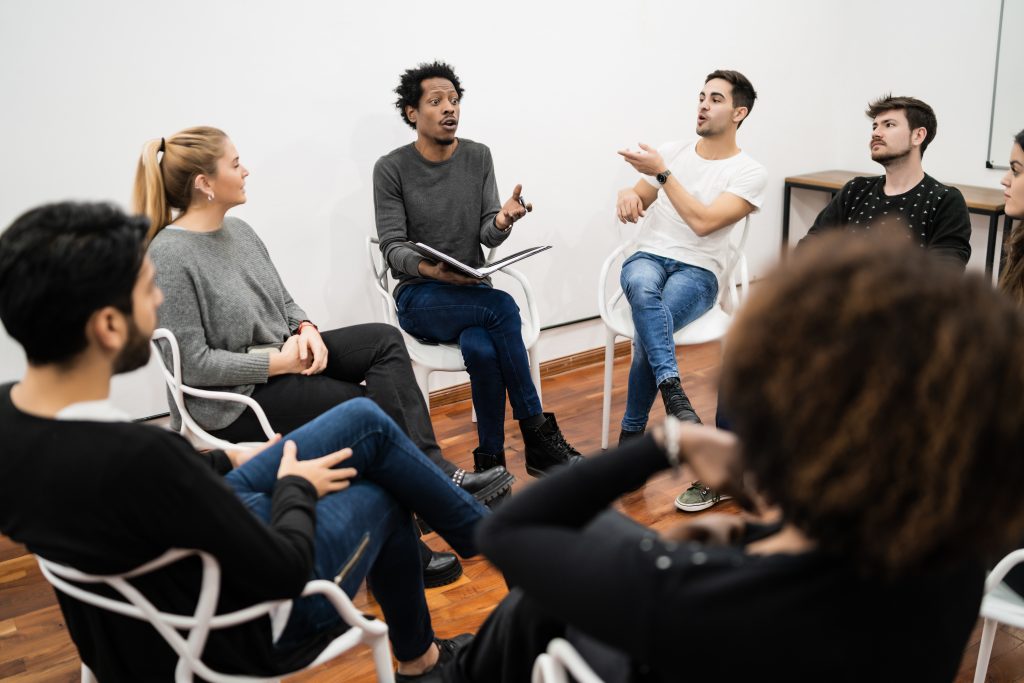Peer-to-Peer Activity: Unpacking
Overview
This activity allows participants to break down Commitment IV into different elements through personal reflection and group discussion, providing a richer understanding of religious or belief pluralism.
Competencies
- Participants identify positive ways to counter discrimination and stay vigilant within their own sphere of influence.
- Participants articulate the high risk of discriminatory potential build into the notions of "state religion" and "doctrinal secularism."

Step-by-Step Instructions
Discussion Questions
Resources
Facilitator Tips
Faith Quotes
Step-by-Step Instructions
INTRODUCTION
- If desired, show the Unpacking PowerPoint to the group. This resource can be used to help participants break down Commitment IV into different elements.
- Allow participants to take 5 minutes to individually reflect on Commitment IV and to write down their thoughts prior to the discussion.
- A review of the context of Module 4 might be helpful as well.
DISCUSSION
- Begin the discussion by asking participants to share their thoughts.
- Edit the PowerPoint and add participant thoughts to the presentation throughout the discussion.
- See discussion questions for a list of questions that can be used to guide the discussion.
- Encourage discussion on the high risk of discriminatory potential inherently built into the notions of “state religion” and “doctrinal secularism”
- Ask participants how they can utilize commitment VI to highlight the importance of the independent role of faith actors to counter discrimination through positive action within their respective spheres.
CONCLUSION
The facilitator should encourage participants to perform a similar exercise with their friends and family or to share the PowerPoint the class worked on through a social media network.
Discussion Questions
- Why is Commitment IV important?
- What are the elements of Commitment IV?
- What action points are necessary?
- Who bears responsibility for action?
- How can I support and promote equal treatment of others of different faiths and/or beliefs?
- What are some forms of discriminatory practices that you have witnessed?
- How are “state religion” or “doctrinal secularism” used to discriminate against individuals or groups?
- How can I prevent such discrimination?
Resources
Facilitator Tips
- The #Faith4Rights modules are flexible and require adaptation by the facilitators before their use. Case studies related to peer-to-peer exercises in the 18 modules need to be selected by the facilitators from within the environment where the learning takes place. The #Faith4Rights toolkit is a prototype methodology that requires contextualization, based on the text of the 18 commitments, context and additional supporting documents.
- Not all issues raised need to be resolved. This would be an impossible and even a counterproductive target. The aim is rather to enhance critical thinking and communication skills, admitting that some questions could receive many answers, depending on numerous factors.
- Tensions may occur during discussions related to “faith” and “rights”. Most of these tensions are due to human interpretations. Learning sessions are spaces for constructive dialogue in a dynamic process where tensions can be reduced with the help of clear methodologies, including pre-emptive situation analysis and evidence of positive results in areas of intersectionality between faith and rights.
- When preparing the sessions, facilitators need to factor in the profile, age and backgrounds of participants. Focused attention on the learning objectives can transform tensions into constructive exploration of new ideas.
- Meaningful engagement requires democratically pre-established rules. Facilitators should dedicate time with participants to elaborate these rules together at the outset and acting all along the training as their custodians.
- The time frames suggested in this #Faith4Rights toolkit are merely indicative. Facilitators may adapt them freely to suit the needs of their group of participants. The key balance is between respecting the overall timeframe while not cutting short a positive exchange momentum.
- To ensure optimal and sustainable benefit, facilitators may create a “training notebook” for participants during their peer-to-peer learning sessions. It would contain a compilation of templates to help participants keep track of what they have learned throughout the programme and eventually use this notebook as their personalised follow-up tool.
- When technically feasible, facilitators are also advised to project the module under discussion on screen in order to alternate between discussions thereon and showing the audio-visual materials listed in each module or any other items selected by the facilitator themselves.
Faith Quotes
“Then Peter began to speak: ‘I now realize how true it is that God does not show favoritism.’” (Acts 10:34)